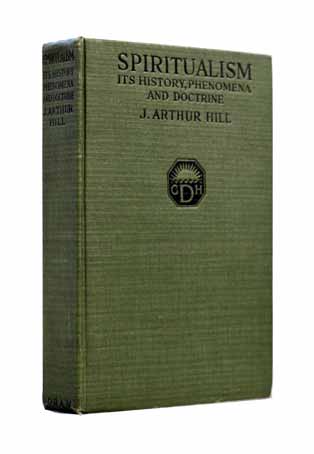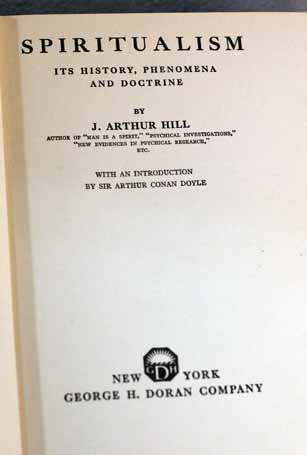Title: Spiritualism: Its History, Phenomena and Doctrine
Author: J Arthur Hill, Sir Arthur Conan Doyle (intro)
Publisher: George H Doran & Co, 1919. First edition.
Condition: Hardcover, green cloth. In very good condition. Firmly bound, clean, slight fraying to ends of spine.
A very comprehensive survey of ‘spiritualism’ – the survival of a being after death – undertaken by an agnostic. Introduction by Sir Arthur Conan Doyle of Sherlock Holmes fame.
Contents
Introduction by Sir A. Conan Doyle
PART I
CHAPTER
I. Antecedents of Modern Spiritualism . . 1
Fundamental conception of Survival and Communication
not new — Communion of Saints — Rise of Science and
Critical method — Moral revolt against Hell — Disbelief
in Survival resulted from these two causes — Spiritualism
restored Belief, on basis of facts as in Early Christianity
— Providential wisdom shown in delay of Psychical Sci-
ence until after establishment of Physical Science — Bib-
lical Spiritualism — Greek Oracles — Plutarch — Virgil,
Eneas’ Vision, Dido’s Dream — Pliny — Neo-Platonism —
Chinese Spiritualism — Jews and Teraphim — Nuns of
Cevennes — St. MSdard — Irvingites
II. SWEDENBORG 17
Birth (1688) and Education — Assessor — Scientific genius
— Illumination in 1743 — “Arcana Ccelestia” — The Stock-
holm fire — The Herteville case of Hidden Receipt — Kant’s
opinion — Swedenborg’s sanity — Details about Next State
— Recognition by friends — Continuity of character —
Children grow up — Heavens and Hells — Houses, cities —
All Angels first human beings — Swedenborg to be re-
garded as Prophet but not infallible
III. Confluence of Swedenborgianism and Mes-
merism in America 30
Swedenborg not unique — Other Trance-seers — Mesmer’s
patients — Jung-Stilling — Mesmerism in New England —
Crank communities — O. W. Holmes — Emerson — A. J.
Davis — Clairvoyance — His first book, 1847 — Teaching —
Spheres — Hudson Tuttle’s doctrine as to the Spheres —
Professor Hare, Epes Sargent, Judge Edmunds
IV. The Hydesville Knockings 40
Fox family of Hydesville — Raps, 1848 — Supposed mur-
der, not well evidenced — Controversy concerning the
raps — the Buffalo doctors — No certainty now attainable
— Dr. Phelp’s Poltergeist — A. J. Davis’s opinion — Judge
Edmunds’s
V. Early Days in England 44
Mrs. Hayden and Mrs. Roberts — D. D. Home — Brown-
ing’s suggestion of fraud unfounded — Mrs. Lyon — No-
table sitters with Home — His travels — Sir William
Crookes’s investigations — Automatic Writing and Draw-
ing by the Howitts and others — Angel Gabriel — But good
done in spite of extravagances — Secularists converted —
Spiritual Telegraph at Keighley — Davenport Brothers —
Mrs. Everitt — David Duguid — Eglinton — Evidence for
Materialisation inconclusive — The Dialectical Society’s
Report
VI. William Stainton Moses 60
Birth (1839) and Education — Curacies — Mastership at
University College School — Death in 1892 — His phenom-
ena — Serjeant Cox’s description of incidents — The Speer
sittings — Musician-spirits— Imperator — Main aim the
broadening of Mr. Moses’ theology — Evidential details —
Steam-roller — Blanche Abercromby — Abraham Floren-
tine — Testimony to Mr. Moses’ high character — His
books
VII. The Society for Psychical Research . . 70
Founding by Cox of “Psychological Society,” 1875 — Dis-
solved in 1879 — S. P. R. founded, 1882 — Objects — Meth-
ods — No creed — Critics — Mrs. Piper — Integrity — Phinuit
regime — George Pelham — “Imperator” band — Classical
matter unknown to the medium — Manner of the trance —
Now ceased — Other mediums, non-professional — Mrs.
Thompson — Reports by Dr. van Eeden and Mrs. Verrall
— Cross-correspondences — Classical allusions in scripts of
non-classical Automatists — General mind-stuff theory —
Sir Oliver Lodge’s “Raymond” — Sir William Barrett’s
“On the Threshold of the Unseen”
VIII. Physical Phenomena 94
Line rather arbitrary, but Physical Phenomena mostly
meaning demonstrably Supernormal movement or Be-
haviour of Matter — The Wesley haunt — Worksop and
Folkestone poltergeists — Eusapia Palladino — Raps — Dr.
Joseph Maxwell — Dr. Crawford and the Goligher circle —
Direct Voice, Admiral Usborne Moore’s investigations —
Spirit Photography
IX. Confirmatory Phenomena in India . . . 109
Wide distribution of phenomena — Jacollist’s book — Vase-
movements — Raps — Table made heavy — Harmoniflute
playing untouched — Materialisation — Identity-evidence
— Jacollist’s Sceptical attitude — The Brahmanic scheme
very like that of A. T. Davis
X. Ghosts 116
Facts in nature, though exceptional ones, like globular
lightning — Definition — ” Hallucination ” — ” Proceedings,”
S. P. R., vol x — “Phantasms of the Living” — Mr.
Walker-Anderson’s case — Projection of Phantasm by Mr.
S. H. Beard — Possible subjectivity — Local Ghosts —
Lytton and eidola, ghost being only a partial manifesta-
tion of the total self — “Induced” Ghost seeing: normal
Clairvoyance — Illustrations of Mr. Wilkinson’s medium-
ship — Evidence that deceased people come to meet their
dying friends
XI. On Evidence, Proof and Belief …. 126
Survival accepted even by sceptical wing of S. P. R. —
Mrs. Sidgwick — Difference between Psychical Research-
ers and Spiritualists — Subliminal Memory — Coleridge’s
story of the polyglossal servant-girl — Hypnotic experi-
ments — Multiple personality — Blanche Poynings — But
evidence goes beyond Subliminal Memory — Nature of
Trance-Controls — Standards of proof — Critic’s low stan-
dard — Must be cumulative — Coercive proof not possible
— Psychology of belief — Personal history in reaching
convictions
PART II
I. Spiritualism as a Religion 143
Cause of Spiritualistic Secession from other sects — Not
antagonistic to any except those holding crude beliefs
mainly as to Eschatology — Seven Principles of Spiritual-
ism — More Christian than some modern forms of Chris-
tianity — Organisation — Number of Societies — Demo-
cratic, as Christianity was at first — Specimen service,
with Clairvoyance — Sunday Schools or Lyceums — Their
methods
II. Spiritualism as a Religion (continued) . . 171
Internal friction and fission in Societies — Lack of Rever-
ence in services — Longwindedness of speakers — Some
“mediums” not mediumistic but only cases of Multiple
Personality — Necessity of evidence of Supernormality —
Private circles — Questionably good — Dark sittings — But
notwithstanding crudities, Spiritualists have the root of
the matter — They have forced the facts into prominence
— Spiritualism in America, France, Italy, Germany,
Spain, South America, Russia, Australia, New Zealand —
Agitation at home for repeal of Witchcraft Laws — Case
for and against
III. Materialistic and Other Objections . . 180
A priori negations — The things do not happen — Professor
Miinsterberg, Mr. Frederic Harrison, Tyndall — Huxley’s
wiser attitude — Mr. Edward Clodd — Sir E. Ray Lan-
kester — No experimental demonstration of Volcanic erup-
tions, Earthquakes, or even Thunderstorms possible
IV. Roman Catholic and Mystical Objections . 191
The things happen, but are the work of Devils — Lord
Alfred Douglas — Prohibition wise for many people — But
conservatism may be overdone — High moral teaching —
Father Bernard Vaughan — Mystical objections — Some
force in them, and valid for some people — But Reason is
a Divine Gift, as well as Intuition — Civilisation a good
thing — But each must decide for himself — All extremes
to be avoided, but no directions banned
V. Some Protestant Objections 200
Misunderstanding that spirits can be “called up” — The
Christian and Joyful News — Allegations of insanity
caused — Probably more insanity caused by Hell-belief —
Specific answers to the charge — “Triviality” of Messages
— But small things are often the best evidence — And
A. J. Davis wrote thirty volumes of serious matter, non-
evidential — Leviticus — But do its quoters observe its
other prohibitions as well? — Bishop of Oxford — A weighty
objection — Belief in Survival more wholesomely based on
faith in God than on phenomena — But the Early Chris-
tians based their belief on Phenomena (Christ’s Resur-
rection) — And for many people a Phenomena-based Be-
lief seems the only way back to Religion
VI. Fechner’s Theory of Life after Death . 212
The World-Soul — Human Personality perhaps a part of
it — Inorganic Matter not unconscious — Saturated with
Mind — But Selves do not merge after bodily Death —
Individuality continues to grow — The post-mortem Body
— Material results of Earth-Actions and Thoughts —
Rapport-objects — Links up with Myers’s Subliminal —
Recognition after Death — Deeper sleep, wider memory,
till Death restores all, forgotten things having preceded
us — Scientific nature of Fechner’s system
VII. Spiritualistic Conceptions of After-Death
Conditions 228
Swedenborgian in asserting Similarity to Earth-life, but
more optimistic — Universal Salvation — Spheres — Jews
and Plurality of Heavens — Paul’s “Third Heaven” —
Summerland — Tuttle, McKenzie, Wilson — The Theo-
sophical scheme — A compromise scheme suggested, in-
cluding elements of Origen and Fechner — Best Spiritual-
istic opinion wisely restrained as to Definite Spheres —
Stead’s “After Death” — Excessive Mourning wrong —
Love the chief thing — Experiences at Death — Stainton
Moses, information from spirit about conditions over
there — Reality of the life
VIII. Conclusion 244
Summing up — Belief in Survival became moribund in
early nineteenth century — Spiritualism revived it by
finding and emphasising same sort of Phenomena as
those on which Christianity was based — Swedenborg had
prepared the way — S. P. R. work — But Spiritualism is
more than belief in Survival and Communication, it is a
Religion — Includes Fatherhood of God and Brotherhood
of Man — Is nearer the Christianity of the first three cen-
turies than is the Christian Orthodoxy of to-day — Oppo-
sition based mainly on ignorance — Nature of future life —
Spiritualistic opinion regarding Christ — The seven articles
repeated



